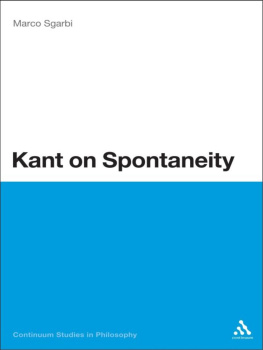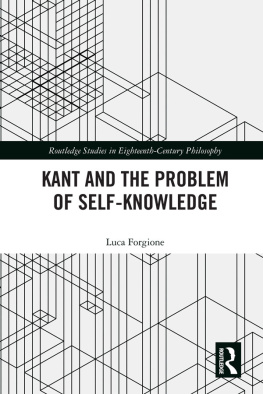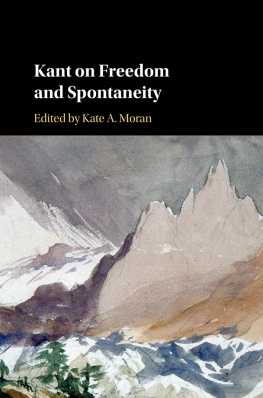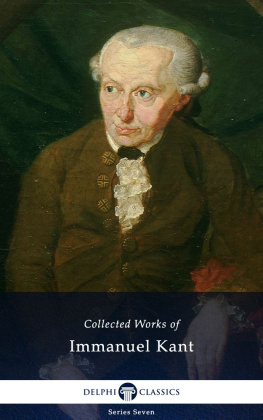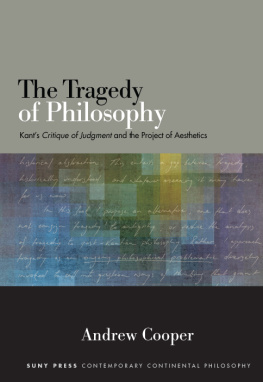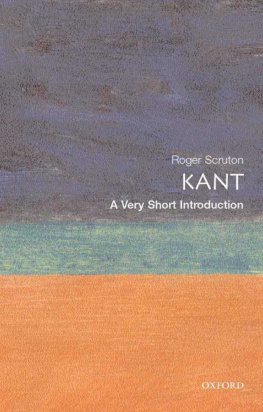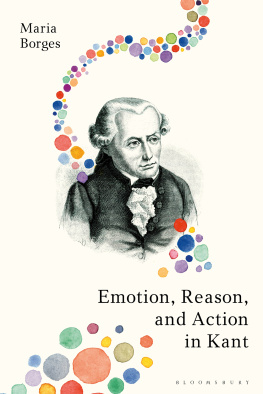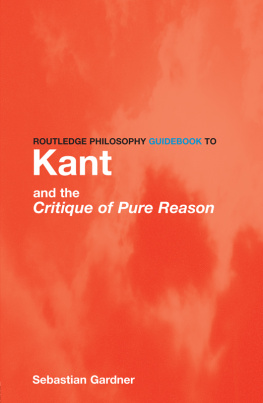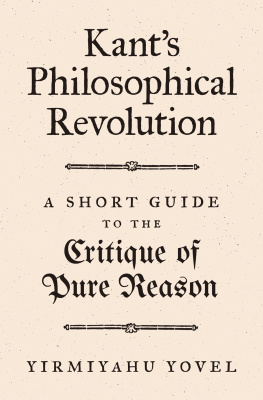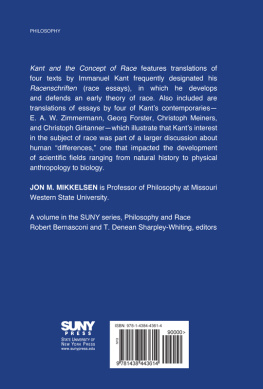Kant on Spontaneity
Continuum Studies in Philosophy
Continuum Studies in Philosophy is a major monograph series from Continuum. The series features first-class scholarly research monographs across the whole field of philosophy. Each work makes a major contribution to the field of philosophical research.
Aesthetic in Kant, James Kirwan
Analytic Philosophy: The History of an Illusion, Aaron Preston
Aquinas and the Ship of Theseus, Christopher Brown
Augustine and Roman Virtue, Brian Harding
The Challenge of Relativism, Patrick Phillips
Demands of Taste in Kants Aesthetics, Brent Kalar
Descartes and the Metaphysics of Human Nature, Justin Skirry
Descartes Theory of Ideas, David Clemenson
Dialectic of Romanticism, Peter Murphy and David Roberts
Duns Scotus and the Problem of Universals, Todd Bates
Hegels Philosophy of Language, Jim Vernon
Hegels Philosophy of Right, David James
Hegels Theory of Recognition, Sybol S. C. Anderson
The History of Intentionality, Ryan Hickerson
Kantian Deeds, Henrik Jker Bjerre
Kierkegaard, Metaphysics and Political Theory, Alison Assiter
Kierkegaards Analysis of Radical Evil, David A. Roberts
Leibniz Re-interpreted, Lloyd Strickland
Metaphysics and the End of Philosophy, H. O. Mounce
Nietzsche and the Greeks, Dale Wilkerson
Origins of Analytic Philosophy, Delbert Reed
Philosophy of Miracles, David Corner
Platonism, Music and the Listeners Share, Christopher Norris
Poppers Theory of Science, Carlos Garcia
Postanalytic and Metacontinental, edited by James Williams, Jack Reynolds, James Chase and Ed Mares
Rationality and Feminist Philosophy, Deborah K. Heikes
Re-thinking the Cogito, Christopher Norris
Role of God in Spinozas Metaphysics, Sherry Deveaux
Rousseau and Radical Democracy, Kevin Inston
Rousseau and the Ethics of Virtue, James Delaney
Rousseaus Theory of Freedom, Matthew Simpson
Spinoza and the Stoics, Firmin DeBrabander
Spinozas Radical Cartesian Mind, Tammy Nyden-Bullock
St Augustine and the Theory of Just War, John Mark Mattox
St Augustine of Hippo, R. W. Dyson
Thomas Aquinas & John Duns Scotus, Alex Hall
Tolerance and the Ethical Life, Andrew Fiala
Kant on Spontaneity
Marco Sgarbi
Continuum Studies in Philosophy

Continuum International Publishing Group
The Tower Building 11 York Road London SE1 7NX
80 Maiden Lane Suite 704 New York NY 10038
www.continuumbooks.com
Marco Sgarbi, 2012
All rights reserved. No part of this publication may be reproduced or transmitted in any form or by any means, electronic or mechanical, including photocopying, recording, or any information storage or retrieval system, without prior permission in writing from the publishers.
The author has asserted his right under the Copyright, Designs and Patents Act, 1988, to be identified as Author of this work.
British Library Cataloguing-in-Publication Data
A catalogue record for this book is available from the British Library.
ISBN: 978-1-4411-1528-7
Library of Congress Cataloging-in-Publication Data
Sgarbi, Marco, 1982
Kant on spontaneity / Marco Sgarbi.
p. cm. (Continuum studies in philosophy)
Includes bibliographical references (p. ) and index.
ISBN 978-1-4411-3319-9 (hardcover : alk. paper) ISBN 978-1-4411-4342-6 (ebook pdf : alk. paper) 1. Kant, Immanuel, 1724-1804. 2. Spontaneity (Philosophy) I. Title.
B2798.S49 2012
193dc23
2012000805
Contents
Acknowledgements
I gratefully acknowledge the help and support of numerous people and institutions while I was working on this book. This research has been possible thanks to a Frances A. Yates Short-Term Fellowship at the Warburg Institute and to an Assegno di ricerca at the Dipartimento di Filosofia of the Universit di Verona. I have been thinking about the issues discussed in this book since I participated in The New School Universitys Second Annual International Undergraduate Philosophy Conference on Kants Moral and Aesthetic Philosophy, the 4th and 5th of March, 2005, organized by Jennifer A. Bautz. Subsequently, I have benefited from interactions with an increasing number of Kantian scholars such as Reinhard Brandt, Wolfgang Carl, Bernd Drflinger, Flix Duque, Costantino Esposito, Alfredo Ferrarin, Eckart Frster, Piero Giordanetti, Paul Guyer, Norbert Hinske, Hansmichael Hohenegger, Rolf Peter-Horstmann, Patricia Kitcher, Heiner F. Klemme, Claudio La Rocca, Mario G. Lombardo, Mario Longo, Rudolf A. Makkreel, Massimo Marassi, Ferdinando L. Marcolungo, Massimo Mori, Alessandro Pinzani, Stefano Poggi, Ubirajara Rancan de Azevedo Marques, Leonel Ribeiro dos Santos, Valerio Rocco Lozano, Tom Rockmore, Paola Rumore, Clemens Schwaiger, Pedro Jess Teruel, Mara Jess Vzquez Lobeiras and Gnter Zller. My gratitude to the participants to the following conferences Kant and the Philosophical Tradition/Kant Today (Verona-Padova, 225 January 2008), Kants Critique of Judgement: Art, Science, and Religion (Baltimore, 289 March 2008) and Kant e la biologia (Marilia, 1012 August 2010) for feedback, comments and suggestions. While any list of reasonable length would be undoubtedly incomplete, I nonetheless want to acknowledge the great help of Seung-Kee Lee and Riccardo Pozzo, and the everyday patient support of Laura Anna Macor.
Sources and Abbreviations
All citations and references to Kants works are located by volume and page number as in Kants gesammelte Schriften = KGS, edited by the Royal Prussian (later German, then Berlin-Brandenburg) Academy of Sciences (Berlin: Georg Reimer, later Walter de Gruyter & Co., 1900). Arabic numerals indicate first the volume and then the page number of this edition. The one exception to this rule is the Critique of Pure Reason = CPR, where passages are located by numbers from A, the first edition of 1781, and/or B, the second edition of 1787. The pagination of the Academy Edition is reproduced in almost all modern English translations of Kants writings.
Unless otherwise noted, the translations are from the Cambridge Edition of theWorks of Immanuel Kant (Cambridge: Cambridge University Press, 1992).
| GP | Carl I. Gerhardt (ed.), Die philosophischen Schriften von Gottfried Wilhelm Leibniz (Berlin: Weidmann, 187590). |
| A | Leibniz: Smtliche Schriften und Briefe (Darmstadt-Berlin: Akademie-Verlag, 1923). |
Chapter 1
Introduction: The Problem of
Spontaneity in Kant
I The Problem
Spontaneity is a key concept in Kants philosophy, yet the philosopher from Knigsberg never dealt with it explicitly, and it often tended to be presented as an insoluble problem concerning human reason. The ambiguity with which he faced this problem is unusual and unexpected when one considers that he was the philosopher who based his theoretical programme on the critique of the faculties of knowledge, feeling and desire. However, spontaneity in Kant seems to avoid any possible critique and appears to be the uncriticized presupposition of critical philosophy: it becomes the very core of every faculty of the mind that defines humans as rational beings.

